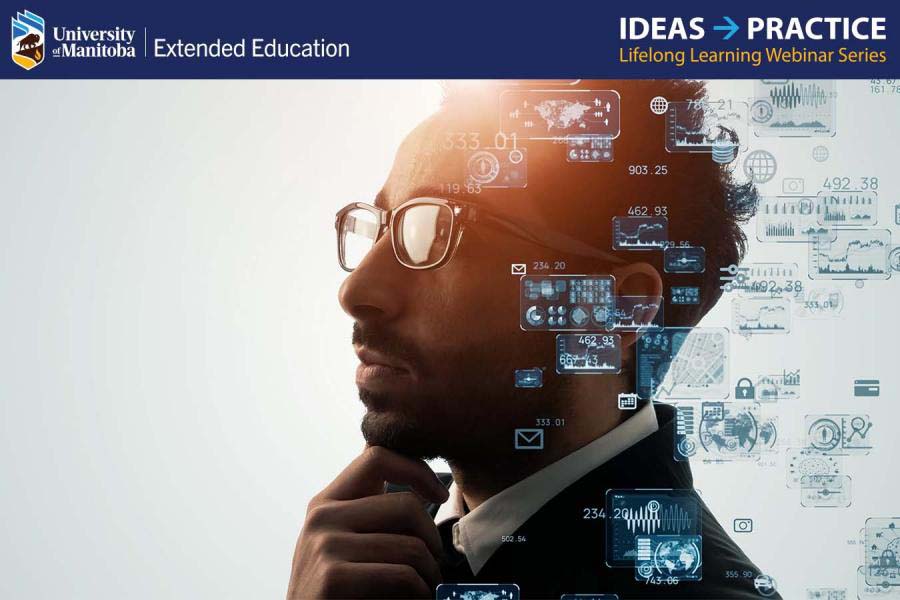
AI webinar series continues.
Generative AI may be the biggest thing since the internet for teaching and learning
Lifelong learning webinar series continues
Generative AI is the biggest development of our time. Like the internet, it will have a huge impact on teaching and learning.
The AI tools of today go so far beyond what we are familiar with, and they continue to evolve, says Ray Schroeder, in conversation with Rod Lastra, Acting Dean, Extended Education. “Too many of us make first-level use of them, using them like Google search, rather than really using them as an assistant. They can provide so much more than that. We must help universities to understand the immensity and the potential they can provide to us.”
Schroeder shared these and other thoughts at the latest webinar in Extended Education’s Lifelong Learning webinar series, AI Unleashed: Deciphering the Impact of Generative Artificial Intelligence on Lifelong Learning. The topic was Lifelong Learning and Generative AI: Unpacking ChatGPT’s Potential.
Schroeder, Senior Fellow at UPCEA, the Online and Professional Education Association, and Professor Emeritus at University of Illinois Springfield (UIS), collects trending articles on generative AI in higher education on his blog. He started teaching in 1971.
When calculators came along
“Technology has always been engaged in the process of education,” says Schroeder, noting many new technologies he discovered over the years. For example, in the early 1970s, students had to leave their calculators at the front of the class before they took a quiz.
“With calculators, no one will be able to add, they said. The concern went away, and yet it was also correct,” says Schroeder, noting how everyone now has access to calculating technology.
Later, Google Wave provided a host of java-based applications. Then they turned it off.
“Technology has moved forward in bits and starts.”
The latest thing is ChatGPT, something that fascinates Rod Lastra, Acting Dean, Extended Education. With ChatGPT, Lastra generated an AI logo for his presentation notes. He shared how, with Chat GPT, in just three hours, he created an “assistant” to help with program development. He discussed the process from providing prompts to how meaning and context are defined with statistical probability.
Chat GPT will be a year old by the end of November and it continues to evolve. “Right now, our trust of text authoring is low, but it shows more promise for reviewing information and for creative works,” says Lastra.
Not all are embracing it
For successful work with Generative AI, Schroeder advises, “We must practice crafting quality prompts, use three different applications, compare the results because glitches occur, and this helps us not to be led astray. Do it daily. We will get better at using it through repetition.”
But not every educator is embracing the latest technology.
Schroeder shared the results of a recent university study that found 80 per cent of students reported using Generative AI but only 30 per cent of faculty did. “I think there is skepticism among many. We saw this in the early 2000s with online learning. Many faculty said no, they had to see students, it would never be as fully effective as face-to-face.
“Many faculty are intimidated by technology and are afraid to use it. Students don’t have that fear. They have an excitement. Faculty have reservations.” But both Lastra and Schroeder see great potential.
“When you have classes of 30 students, it is so hard to work with individuals and provide tutoring. But what if AI could identify areas of deficit and help students to improve their critical thinking and fully understand? We can find ways to address the challenges, to use the tools and watch the progress,” says Schroeder, noting the hiring of the first Chief AI Officer at a university, Mark Daley at Western, was a big step forward. “This technology is so very important.”
While Generative AI is relatively new, Schroeder noted a tracking study on the use of generative AI at Boston Consulting Group. It found an increase in productivity of 40 per cent with those who used AI, as well as an improvement in low performance.
“The Open AI Academy is expected to open by the end of this year. It will be a free site providing bots to serve as instructors, guided by uploaded information. Other companies are also poised to provide services. How will it roll out in our institutions?” asks Schroeder.
The series continues.
Watch this webinar and learn more about the series.






